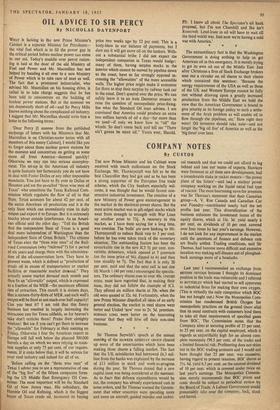COMPANY NOTES
By CUSTOS THE new Prime Minister and his Cabinet were received with much enthusiasm on the Stock Exchange. Mr. Thorneycroft was felt to be the best Chancellor they had got and as he has been a strong supporter of the European free trade scheme, which the City bankers especially wel- come, it was thought that he would favour con- structive industrial investment. The creation of a new Ministry of Power gave encouragement to the market in the electrical-power shares. But the most active market was in gilt-edged stocks which went from strength to strength with War Loan up another point to 73k. A recovery in this market, as 1 have been saying for a long time, was overdue. The 'bulls' are now looking to Mr. Thorneycroft to reduce Bank rate to 5 per cent. before he has even taken stock of the monetary situation. The outstanding feature has been the remarkable rise in the new ICI 5-1 per cent. con- vertible debenture, which opened at 5 premium (on the issue price of 96), dipped to 41 and then rose steadily to 7. The fact that it is only 20 per cent. paid and that the next call is not due till March I (40 per cent.) encouraged the specula- tors. The ordinary shares rose to over 40s. UNITED STEEL must have regretted that, in making their issue, they did not follifw the example of 1C1. They offered six million shares at 30s. when the old were quoted at 32s. 6d. Fortunately, when the new Prime Minister dispelled all ideas of an early general election, the market in steel shares went better and United 'new' rose to 2s. 3d. premium. DORMAN LONG were better on the interesting rumour that they will hive off their non-steel
business. •
Sir Thomas Sopwith's speech at the annual meeting of the HAWKER SIDDF.LEY GROUP cleared up some of the uncertainties which have been making these shares a falling market. The fact that the UK subsidiaries had borrowed £6.3 mil- lion from the banks was explained by the increase of £13 million in stock and work-in-progress during the year. Sir Thomas denied that a new capital issue was being considered at the moment As to fears that defence expenditures would be cut, the company has already experienced cuts in some orders, and Sir Thomas warned the Govern- ment that other countries were spending more and more on aircraft, guided missiles and techni- cal research and that we could not afford to lag behind and lose our teams of experts. Hawkers were foremost in all these new developments, had a considerable stake in rocket motors—'the power plant of the future'—and had a nuclear power company working on the liquid metal fuel type of reactor. The most heartening news for investors was Sir Thomas's statement that their Canadian group—A. V. Roe Canada and Canadian Car and Foundry—contributed nearly half the net profits last year. This diversification of the business enhances the investment status of the equity shares, which at 33s. 3d. yield nearly 6 per cent, on dividends of 10 per cent. covered over four times by last year's earnings. However, I do not look for any improvement in the market until the questions of finance and defence cuts are finally settled. Trading conditions, said Sir Thomas, had become more difficult and excessive taxation was making self-finance out of ploughed- back earnings more of a headache.
• • •
Last year I recommended an exchange from BRITISFI OXYGEN because I thought its dominant position in the trade was vulnerable and I referred to BUTIERLEY which had started to sell apparatus to industrial firms for making their own oxygen. (This is virtually the only competitor which BOC has not bought out.) Now the Monopolies Com- mission has condemned British Oxygen for monopolistic practices on the ground (inter alio) that its usual contracts with customers bind them to take all their requirements of specified gases from BOC. The Commission states that the Company aims at securing profits of 23 per cent. to 25 per cent. on the capital employed, which it regards as unjustifiably high for an almost com- plete monopoly (98.5 per cent, of the trade) and a limited financial risk. Profiteering does not shine out in the HOC trading accounts and I would not have thought that 25 per cent. was excessive, having regard to present taxation. BOC shares at 31s. 6d. yield 6.3 per cent. on the assured dividend of 10 per cent, which is covered under twice on last year's earnings. The Monopolies Commis- sion merely recommends that BOC prices and costs should be subject to periodical review by the Board of Trade. A Labour Government would presumably take over the company, lock, stock and barrel.


































 Previous page
Previous page